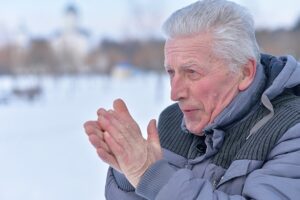
If you are like most, you feel cold every now and then during the winter. What you may not know is that just being really cold can make you very sick. Older adults can lose body heat fast—faster than when they were young. Changes in your body that come with aging can make it harder for you to be aware of getting cold. A big chill can turn into a dangerous problem before an older person even knows what’s happening. Doctors call this serious problem hypothermia.
What Is Hypothermia?
Hypothermia is what happens when your body temperature gets very low. For an older person, a body temperature of 95°F or lower can cause many health problems, such as a heart attack, kidney problems, liver damage, or worse.
Keep Warm Inside.
Living in a cold house, apartment, or other building can cause hypothermia. In fact, hypothermia can happen to someone in a nursing home or group facility if the rooms are not kept warm enough. If someone you know is in a group facility, pay attention to the inside temperature and to whether that person is dressed warmly enough.
Here are some tips for keeping warm while you’re inside:
- Set your heat to at least 68–70°F. To save on heating bills, close off rooms you are not using.
- Make sure your house isn’t losing heat through windows. Keep your blinds and curtains closed. If you have gaps around the windows, try using weather stripping or caulk to keep the cold air out.
- Dress warmly on cold days even if you are staying in the house. Throw a blanket over your legs. Wear socks and slippers.
- When you go to sleep, wear long underwear under your pajamas, and use extra covers. Wear a cap or hat.
- Make sure you eat enough food to keep up your weight. If you don’t eat well, you might have less fat under your skin. Body fat helps you to stay warm.
- Ask family or friends to check on you during cold weather. If a power outage leaves you without heat, stay with a relative or friend.
You may be tempted to warm your room with a space heater. But, some space heaters are fire hazards, and others can cause carbon monoxide poisoning. The Consumer Product Safety Commission has information on the use of space heaters. Read the following for more information: Reducing Fire Hazards for Portable Electric Heaters and Seven Highly Effective Portable Heater Safety Habits.
Bundle Up on Windy, Cold Days
A heavy wind can quickly lower your body temperature. Check the weather forecast for windy and cold days. On those days, try to stay inside or in a warm place. If you have to go out, wear warm clothes, and don’t stay out in the cold and wind for a long time.
Illness, Medicines, and Cold Weather
Some illnesses may make it harder for your body to stay warm.
- Thyroid problems can make it hard to maintain a normal body temperature.
- Diabetes can keep blood from flowing normally to provide warmth.
- Parkinson’s disease and arthritis can make it hard to put on more clothes, use a blanket, or get out of the cold.
- Memory loss can cause a person to go outside without the right clothing.
What Are the Warning Signs of Hypothermia?
Early signs of hypothermia:
- Cold feet and hands
- Puffy or swollen face
- Pale skin
- Shivering (in some cases the person with hypothermia does not shiver)
- Slower than normal speech or slurring words
- Acting sleepy
- Being angry or confused
Later signs of hypothermia:
- Moving slowly, trouble walking, or being clumsy
- Stiff and jerky arm or leg movements
- Slow heartbeat
- Slow, shallow breathing
- Blacking out or losing consciousness
Call 9-1-1 right away if you think someone has warning signs of hypothermia.
What to do after you call 9-1-1:
- Try to move the person to a warmer place.
- Wrap the person in a warm blanket, towels, or coats.
- Give the person something warm to drink, but avoid drinks with alcohol or caffeine.
- Do not rub the person’s legs or arms.
- Do not try to warm the person in a bath.
- Do not use a heating pad.

